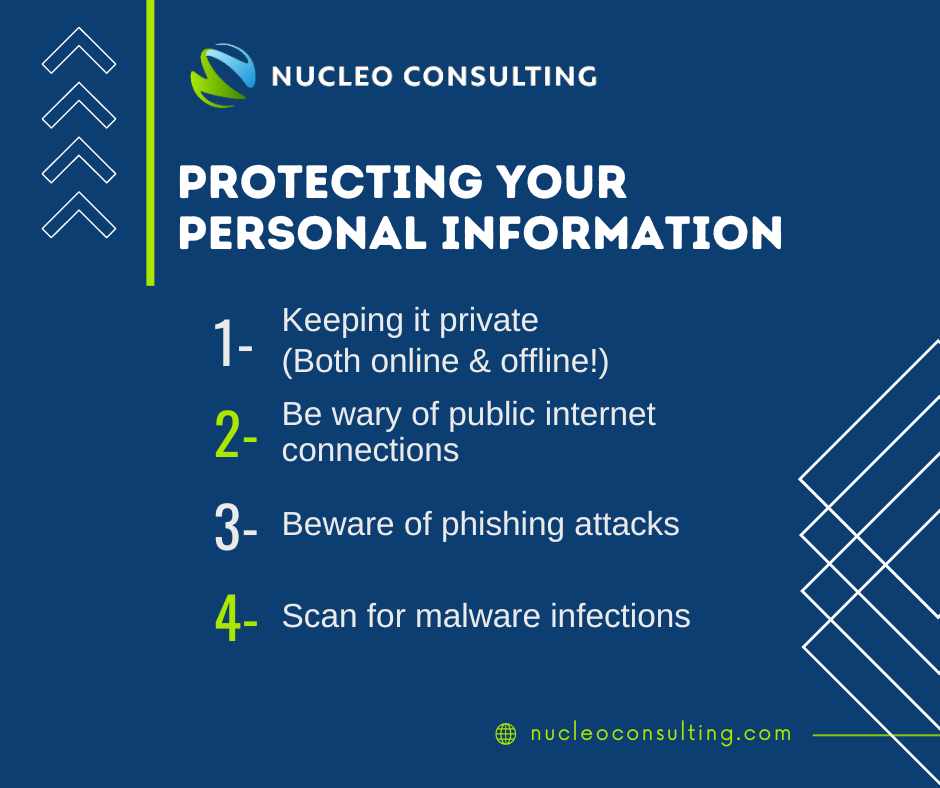Cyber Security: Protect Your Personal Information
[2 mins read]
Sensitive information is the key to the gold mine for cybercriminals. With stolen sensitive information, cybercriminals may use it as fuel for other cyber crimes such as identity theft, phishing, blackmailing, extortion, impersonation, ruining your reputation, or simply just selling the information on the black market for a profit.
Personal data
Your personal data is unique to you and should be kept personal. Examples of your personal sensitive information are your identification number, address, contact number, your banking or credit card details, your legal contracts and documents, healthcare/ insurance documents, login credentials, and so on.
Personal information is your most valuable asset and should be well protected to avoid identity theft, where criminals make use of stolen personal information to impersonate you. Stolen information can be used to open new online accounts, take up loans, or launch phishing or scam attacks on your friends and family members.
Protecting your personal information

Keep it private
Don’t we all love sharing photos of where we go, or what we eat on social media? Remember to take a good look before posting. Items like air tickets, credit cards, your newly received parcels, or your letters may contain your personal information! Beware of what you share online!
Sensitive data should not be written on papers that are laying around. If you have to scribble it somewhere, make sure to dispose of it properly by using a shredder, making sure no one can retrieve it for malicious use. Taking these data offline does not mean it’s safe!
Be wary of public internet connection
If you cannot be sure that the connection is secured, don’t use it.
Your personal devices hold important information and personal data about you and your friends/family. You wouldn’t want to take any risk by using an unsecured connection, where hackers can easily hack into your devices!
Beware of phishing attacks
Scammers use many creative techniques to ‘phish’ the information from you. These can be in form of fake phishing websites, malicious emails, spam calls, or spam messages from an imposter, pretending to be someone you know.
Sensitive information and personal data should not be shared online, even if it’s sent to someone you really know. If their device is compromised, the information you sent may be compromised too! Always be wary of the links you click, the websites you do your purchases, and the people you chat with online!
Scan for malware infections
Spyware and other malicious programs may track whatever you do on your devices. Your devices can easily be infected by clicking on malicious links, downloading malicious software, or even infected buttons on unsecured websites.
It is always recommended to avoid any downloads from unsecured websites or malicious email attachments. Pay attention before clicking on any buttons, or links (URLs), or opening any files from emails. Your devices should always be equipped with reliable antivirus software with regular scans conducted. It’s always better to be safe than sorry!
Recognizing the damages
A data breach may cause serious personal or business damage, no matter how much information was compromised.
You may be exposing the information to cybercriminals, who may use it to fuel other cyber attacks. Information that is useful to cybercriminals are trade secrets, legal contracts, medical documents, personal information, credentials and banking details. Monetary profits are not all these criminals are up to. They may simply use the stolen data to blackmail you or your company (ransom), or other ways to ruin your reputation!
Depending on the situation, you may also be at risk for fines or legal actions against you and/or your employer depending on the sensitivity of the information leaked.
Cyber security is more than just purchasing software to defend against cyber threats. It’s a knowledge, a habit, and a lifestyle. Just like how you lock your doors to avoid intruders in your house, keeping your data safe should not be an option. The damages may not only be solely on yourself, as the data of others you have access to may be at risk too!
Remember, it is always better to be safe, than sorry.
IT Tips | Cyber Security | Cyber Threats | Data Protection | Personal Data Protection
